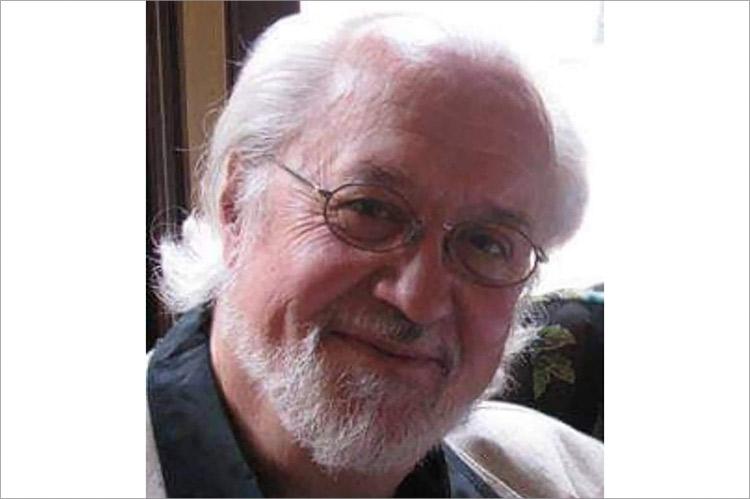Roger Ames’s father was a self-taught church organist, and his mother was a first-grade teacher. “My dad was musical, and he was determined to give my older brother and me music lessons,” he told The Star in 2013. “I was maybe 4 or 5, and I would watch my brother practice his lesson, then I’d get up on the bench and play his lesson myself, by ear. I don’t know if it made me a prodigy, but it sure annoyed my brother.”
More than that, it launched Mr. Ames’s long career as a celebrated composer, conductor, and educator who created cantatas, oratorios, choral music, folk songs, operas, and works for musical theater, while inspiring generations of students and being invited to residencies throughout the United States.
Mr. Ames, who lived in Springs for 20 years, died at home in Cumberland, Me., on Jan. 6. He was 77 and had been diagnosed with amyotrophic lateral sclerosis, or Lou Gehrig’s disease, 18 months ago.
Born in Cooperstown, N.Y., on Dec. 2, 1944, to Franklin J. Ames and the former Sara Barker, he grew up in Worcester, N.Y., where he was valedictorian of his high school class. In 1963 he enrolled at the Crane School of Music at the State University at Potsdam. After graduating with a degree in conducting and music education, he taught at high schools in Oneida and Westchester Counties and began writing works for chorus and orchestra.
From there he moved to Washington, D.C., where he founded the Montgomery County Masterworks Chorus and served as minister of music and composer in residence at the Westmoreland Congregational Church in Bethesda, Md. The chorus commissioned “Requiem for Unbelievers,” for which he interspersed texts of the poet Anne Sexton with traditional Latin text sections of the Mass.
After spending some time in Europe, Mr. Ames returned to this country and founded the Berkshire Ensemble for Theater Arts in Williamstown, Mass. He also became chairman of music theater at the Hartt School of Music, Theater, and Dance in Hartford from 1987 to 1992.
While in Hartford, he wrote the music for “Martin Guerre,” his first Regional Equity production, for which Laura Harrington wrote the book. During its sold-out, extended run at the Hartford Stage, The Hartford Courier wrote, “ ‘Martin Guerre’ is in a class by itself . . . the scope of the production is so immense, the music so powerful, that it comes close in spirit and greatness to opera.”
“It was the closest I had come to a real commercial success,” he told The Star. “The producers were sure it would go to New York — until Cameron Mackintosh announced the ‘Les Miz’ team was working on the same story. At that point, the backers disappeared.”
He subsequently wrote other works for the stage, among them “Hearts on Fire,” which premiered at the Contemporary Ensemble of the Minnesota Opera in St. Paul.
Mr. Ames became composer in residence and director of vocal music at Great Neck North High School in 1992. He first visited the South Fork a year later, and in 1995 bought a house in Springs, where he lived full time while commuting to Great Neck.
Shortly after 9/11, the conductor James Jordan commissioned a piece memorializing the children who died in that tragedy. He requested that “Amazing Grace” be at the center of the piece. Mr. Ames combined that with a Kyrie he had written the day of the attack. The resulting oratorio has been performed countless times over the years.
He was composer and collaborator for the Central City Opera/Colorado Springs Conservatory Summer Institute for many years and resident artist at the New Dramatist playwright collective in New York City for almost three decades.
In 2005, mutual friends introduced him to Elizabeth Bassine, a painter and poet, and they were married on Dec. 30 that year. Over the next 15 years, they worked together on two projects for the stage — an opera adapted from “How Green Was My Valley” that premiered as a staged concert in Colorado, and “No Parking,” a musical set in an Alzheimer’s unit in the 1980s. They moved to Maine in 2015.
During his more than two decades at Great Neck North High School, his impact was enormous. Bianca Livi, one of his former students, wrote on a Facebook memorial page, “Roger brought out the best in us by believing in us. He made us feel seen, heard, and special. . . . He brought out our musical talent, and helped us grow into better, kinder, more loving people. Everything he did, he did with love and joy.”
In addition to Ms. Bassine, he is survived by three children, Daniel Ames of Charlotte, N.C., Beth Ames of Portland, Me., and David Ames of Bristol, R.I., two stepchildren, Adam and Joanna Bassine of Cumberland, and one grandchild, David Ames of Charlotte. A brother, Don Ames of Murrells Inlet, S.C., also survives. A previous marriage, to Georgine Resick, ended in divorce.
“Not only a friend beyond measure, but a feeling, loving, and sensitive man beyond measure as well,” his brother said.
Danny Burstein, a friend, put it simply: “Every second spent with Roger was a better one.”
A scattering of ashes will take place at Louse Point in Springs during the summer. Memorial contributions have been suggested to the Sean M. Healey and AMG Center for ALS, 15 Parkman Street, Boston 02114.




